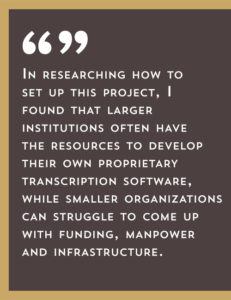 Sara David of the Nantucket Historical Association kindly took the time to answer questions from Sara Brumfield of FromThePage, and discussed their project and experience using the platform.
Sara David of the Nantucket Historical Association kindly took the time to answer questions from Sara Brumfield of FromThePage, and discussed their project and experience using the platform.
David is the Digitization Archivist at the Nantucket Historical Association.
First, tell us about your documents.
The focus for our first attempt at transcription has been our collection of ships' logs books. We have over 400 of them and though some are logs of trading, passenger, and military vessels, most of them are from whaling ships and voyages.
In revisiting this collection, we found 13 of the logs in our holdings were kept by women — wives that accompanied their husbands (the masters) on voyages. These volumes seemed like they would be interesting first projects as they offer another lens through which to observe seafaring life.
As I scan through the collection, I look for logs that are illustrated, contain poetry, or seem like they are written in an engaging way to put up for transcription.
Moving forward we hope to make other manuscripts available for transcription that help illuminate the history of the island and life on Nantucket, including personal journals, ledgers, letters, etcetera.
What are your goals for the project?
To increase accessibility of our collections for our patrons and better facilitate research through digitization and transcription!
How are you recruiting or finding volunteers/collaborators?
Project updates get featured semi-regularly via the organization's social media and newsletters. This has helped spread the word about current projects to people who have already demonstrated an interest in the organization and collections by following the NHA's social media or by being members.
I also created a press kit with information about the initiative, images, links, etc. to send to different online media to reach new audiences.
When someone new starts transcribing, I always send them an email asking how they found out about our project, many of them reference these articles/features that have since been shared around, particularly through special interest Facebook groups, usually about sailing or history. It has been really exciting and interesting (and informative) to see the traction generated and how word of the project ripples out.
Can you share your experience using FromThePage?
It took a little experimenting to learn how to best use the program (we haven't employed all of the features FromThePage has to offer like indexing), but so far, the initiative have been more successful than I could have imagined!
In researching how to set up this project, I found that larger institutions often have the resources to develop their own proprietary transcription software, while smaller organizations can struggle to come up with funding, manpower, and infrastructure.
For example, the Folger Shakespeare Library has developed their own transcription platform "Dromio." On the other end of the spectrum, a small historical organization I spoke with relies on one volunteer casually transcribing using Microsoft Word.
I have found FromThePage meets the transcription needs of smaller and medium sized organizations really well! It's easy to get started and easy to maintain.
How does FromThePage & crowdsourcing fit with the mission of a historical association?
Our mission is to preserve and interpret the history of Nantucket in order to promote the island's significance and foster an appreciation of it among all audiences.
Through FromThePage and crowdsourcing, we are able to better share our history by making the collections more available through digitization and more accessible through transcription.
Thanks to FromThePage and our volunteer transcribers, we can reach patrons who may otherwise be unable to visit Nantucket, and those who may not be familiar with cursive handwriting.
What would you tell folks considering a similar project?
Spreading the word about projects and developing relationships with transcribers is key.
There are lots of people all around the world that may be interested in a project, but they have to know about it. Once they have connected with a project, communicating regularly with volunteers is really insightful — they may have questions or suggestions that can help improve the project experience.
It's also important to let transcribers know their time and work is valued, and it's fun to meet interesting people from all over!
